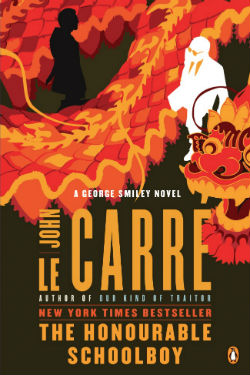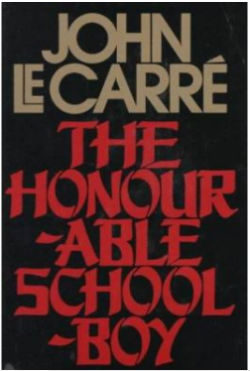 In John Le Carré's Tinker Tailor Soldier Spy, the previous George Smiley adventure, the intelligence officer was surreptitiously tapped to track down a mole—a bellicose cancer—burrowed within The Circus. Smiley pinpointed and exposed the double agent as Bill Haydon. Haydon had been recruited by a Russian operative, known only as Karla, when he was a student at Oxford, and in his succeeding 30-year tenure within the British espionage service, he had climbed to the upper ranks, nearly crippling The Circus with his duplicity. Smiley, subsequently appointed to the role of interim caretaker, has the formidable task of restoring an organization that’s been torn to tatters.
In John Le Carré's Tinker Tailor Soldier Spy, the previous George Smiley adventure, the intelligence officer was surreptitiously tapped to track down a mole—a bellicose cancer—burrowed within The Circus. Smiley pinpointed and exposed the double agent as Bill Haydon. Haydon had been recruited by a Russian operative, known only as Karla, when he was a student at Oxford, and in his succeeding 30-year tenure within the British espionage service, he had climbed to the upper ranks, nearly crippling The Circus with his duplicity. Smiley, subsequently appointed to the role of interim caretaker, has the formidable task of restoring an organization that’s been torn to tatters.
“There were those who seriously believed—inside the Circus, as well as out—that they had heard the last beat of the secret English heart.”
After the unmasking of the traitor, a majority of the agency’s information networks have run cold and the organization is in danger of being shut down. The building in which Smiley and his team work has been ripped to shreds by the 'ferrets' in search of wiretaps and other spy devices, serving as a sobering reminder of their state of affairs. And with the systematic clearing of dubious Circus personal, the agency has become a skeletal apparatus in fear of itself. Even Smiley feels the impact: “The circles around him grew smaller as they grew nearer, and precious few in the early days reached the centre,” Le Carré writes.
Smiley adheres to the old axiom that “The best defense is a good offense,” devising a stratagem with the help of fellow confidants Connie Sachs and Doc di Salis (others include reliable standby Peter Guillam and a factotum named Fawn), focusing their energies on cases that Haydon went out of his way to bury.
The premise was that in briefing Haydon, Karla was exposing the gaps in Moscow Centre’s knowledge; that in ordering Haydon to suppress certain intelligence which came the Circus’s way, in ordering him to downgrade or distort it, to deride it, or even to deny it circulation altogether, Karla was indicating which secrets he did not want revealed.
To that end, The Circus turns their sights to the Far East, finding a trail of Russian money being filtered into Hong Kong and the hounorable schoolboy of the title (a boy scout by American definition): a womanizing, poor excuse for a father, and hapless spy and wannabe author named Westerby.
Gerald Westerby, he told himself. You were present at your birth. You were present at your several marriages and at some of your divorces, and you will certainly be present at your funeral. High time, in our considered view, that you were present at certain other crucial moments in your history.
 Westerby is The Circus’s ticket to get closer to Karla. And Smiley, as revealed in both The Spy Who Came in from the Cold with the ill-fated duo Liz Gold and Alec Leamas and with Leclerc in The Looking Glass War, is adroit at exploiting individual’s weaknesses to meet his own idealistic ends. It also gives Le Carré the chance to do what he does very well, and that’s sermonizing: “He had never seriously doubted, in his vague way, that his country was in a state of irreversible decline, or that his own class was to blame for the mess.”
Westerby is The Circus’s ticket to get closer to Karla. And Smiley, as revealed in both The Spy Who Came in from the Cold with the ill-fated duo Liz Gold and Alec Leamas and with Leclerc in The Looking Glass War, is adroit at exploiting individual’s weaknesses to meet his own idealistic ends. It also gives Le Carré the chance to do what he does very well, and that’s sermonizing: “He had never seriously doubted, in his vague way, that his country was in a state of irreversible decline, or that his own class was to blame for the mess.”
Schoolboy has begun to recede within the Smiley canon. Not as far back as, say, The Looking Glass War, but it is often overlooked. Perhaps because the book is a bit cumbersome—a kinder offering might be “too ambitious”—and until Westerby shows up in full in Chapter Five, it’s quite dry. The ending feels unsatisfactory though far from boring. (The Alec Guinness BBC productions skipped Schoolboy when filming their miniseries [1979, 1982], and now there’s early talk that a possible sequel to the superb Ralph Fiennes 2008 Tinker Tailor remake would also skip this middle installment in what is commonly referred to as the Karla trilogy.) But, criticisms notwithstanding, there’s indeed much to recommend in this tour de force, chiefly Smiley’s counteroffensive salvo against Karla and the cold-hearted precision at which he executes his duties. The opening W.H. Auden quote in The Honourable Schoolboy lingers:
I and the public know
What all schoolchildren learn,
Those to whom evil is done
Do evil in return.
Edward A. Grainger aka David Cranmer is the editor/publisher of theBEAT to a PULP webzine and books and the recent anthology collection, The Lizard’s Ardent Uniform and Other Stories.
Read all of Edward A. Grainger's posts for Criminal Element.

I love his books